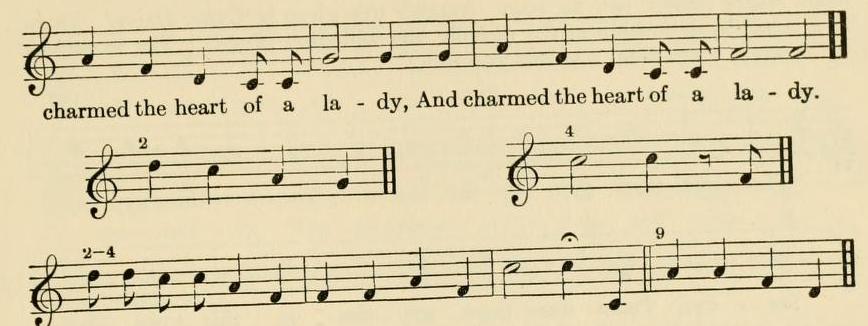Black Jack David- Grogan (NC) 1914 Smith/Brown B
[From Brown Collection of NC Folklore; Vol. 2, 1952. Their notes follow. Text is available in MS (Abrams Collection). The music, apparently from Thomas Smith from Vol. 4, is at the bottom.
Thomas Smith has proven to be an unreliable collector, mainly through his contributions (ballad recreations) to Kyle Davis Jr. (More TBVa, 1960) in the 1930s after he and his brother moved to Virginia. In particular his C and D Brown versions of Child 200 are questionable. He collected from Grogan before, and the circumstances were suspicious. Note the similarity to Brown A; parts of Brown E.
Bronson in TTCB says the Greer version (Brown E) was collected by Alphonso Smith and Thomas Smith. We know that Thomas Smith sent Alphonso Smith a version (or versions) of this ballad in a letter. Thomas Smith however attributes three versions (Brown B-D) to other informants and Greer is not mentioned. From the Greer MS, it's clear that Brown E is a compilation of 2 or more versions. It's possible this (Brown B) was one of Greer's versions, and Thomas Smith attributed it to Grogan to claim a new collection.
R. Matteson 2015]
37. The Gypsy Laddie (Child 200)
Still widely known and sung; see BSM 73-4, and add to the citations there given Massachusetts (FSONE 207-9), Tennessee (SFLQ XI 130-1), North Carolina (FSRA 2)7, one stanza only), Florida (SFLQ viii 156), Arkansas (OFS I 152-3, 155-60), Missouri (OFS I 155-9), Ohio (BSO 67-9), Indiana (BSI 134), and Kittredge's bibliographical note JAFL xxx 323. Texts from the Southern states are likely to include, rather incongruously, stanzas from the wooing song 'Where are you Going, my Pretty Maid?' So in Tennessee (FSSH iii), Mississippi (FSM 118-19), and North Carolina (SCSM 218 and versions A B D E G below).
B. 'Black Jack David.' Sent by Thomas Smith of Zionville, Watauga county, in 1914 to C. Alphonso Smith and later passed on to Dr. Brown. "Written as sung by a neighbor, Mrs. Julia Grogan of Zionville, who learned the ballad from her father." Somewhat nearer than A to the normal form. Here as in A the last line of each stanza is repeated.
I Black Jack David came riding through the woods,
Singing so loud and merry
He made the green woods all around him ring,
And charmed the heart of a lady,
And charmed the heart of a lady.
2 'How old are you, my sweet little miss?
How old are you, my honey?'
She answered him with a 'tee hee hee!
I will be sixteen a Sunday.' [repeat last line throughout]
3 'Come go with me, my pretty little miss,
Come go with me, my honey;
I'll take you across the deep blue sea
Where you never shall want for money.'
4 She pulled off her high-heeled shoes
All made of Spanish leather,
Put on a pair of low-heeled shoes
And they both rode off together.
5 Late that night when the landlord came home
Inquiring for his lady
He was informed by a fair young maid
She had gone with the Black Jack David.
6 'Go saddle for me my milk-white steed,
Go bridle for me my Darby;
I'll ride to the East, I'll ride to the West
Till I overtake my lady.'
7 He rode till he came to the deep blue sea;
The sea was dark and muddy.
Tears came trickling down his cheeks.
For there he saw his lady.
8 'Will you forsake your house and land?
Will you forsake your baby?
Will you forsake your husband dear
And go with the Black Jack David?'
9 'I will forsake my house and land,
I will forsake my baby,
I will forsake my husband dear
And go with the Black Jack David.
10 'Last night I slept on a fine feather bed
Beside my husband and baby;
Tonight I'll sleep on the damp cold ground
In the arms of the Black Jack David.
In the arms of the Black Jack David.'
-----------------------------
Music
B. 'Black Jack David.' Sung by Mrs. Julia Grogan. Recorded at Zionville, Watauga county; no date given. "Written as sung by a neighbor" (II 162) evidently pertains to the text, since we have a recording. Measures 1-2 and 5-6 correspond very closely to those of 37A. There were two more recordings, one of the Michael version, the other anonymous, both of which differ from
this version to a lesser or greater degree. The differences are given below in the variations.


For melodic relationship cf. ***TBV 590-1. No. 37A. last two measures, stanza as well as refrain; **BMFSB 6. Scale: Mode III. plagal. Tonal Center: f, Structure: aba1cc1 (2.a....,a) = ab (4,6). The second phrase is termmally mcremented.